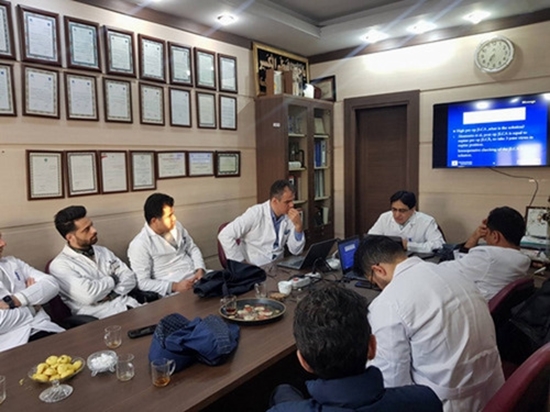The Weekly Hip and Knee Orthopedic Challenges Session was held on Tuesday, December 3, 2024.
The specialized session on hip and knee orthopedic challenges took place on Tuesday morning with the participation of esteemed orthopedic professors and specialists. The hip section covered topics such as "Proximal Migration of Loose Cup" and "FAI Syndrome." The knee section focused on "How to Avoid Joint Line Obliquity in Osteotomy Around the Knee" and "Ways to Avoid IM Rod for Femoral Component Positioning in TKA." This session, part of the ongoing weekly programs of the Joint Replacement Research Center, aimed at knowledge exchange and enhancing the treatment of orthopedic patients. Additionally, 1.5 continuing medical education (CME) credits were awarded to participants.

The Specialized Orthopedic Hip and Knee Challenges Session was held on Tuesday morning from 6:30 AM to 8:00 AM, with the participation of esteemed professors, specialists, and enthusiasts in the field of orthopedics. This session, part of the ongoing weekly scientific programs of the Joint Replacement Research Center, focused on advanced topics in hip and knee surgery.
Topics Discussed in the Hip Section (6:30 AM to 7:10 AM):
- Proximal Migration of Loose Cup: Analyzing the causes and consequences of proximal migration in loose acetabular cups.
- FAI Syndrome: Reviewing the latest findings on Femoroacetabular Impingement Syndrome.
Topics Discussed in the Knee Section (7:15 AM to 8:00 AM):
- How to Avoid Joint Line Obliquity in Osteotomy Around the Knee: Exploring strategies for maintaining joint line balance after knee osteotomy.
- Ways to Avoid IM Rod for Femoral Component Positioning in TKA: Introducing alternative methods for femoral component positioning in total knee arthroplasty without the use of an intramedullary rod.
Outcomes of the Session: This session aimed to facilitate knowledge exchange and experience sharing among orthopedic specialists to enhance patient care quality. The presentations were met with enthusiastic participation, and valuable scientific discussions took place around the presented topics. Additionally, 1.5 continuing medical education (CME) credits were awarded to participants.
The Joint Reconstruction Research Center expresses its appreciation for the active involvement of specialists and invites all interested parties to join future sessions, held every Tuesday morning.





comment